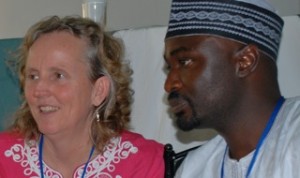Nov 22, 2011
Often times in conversation with someone I haven’t met before, when I mention that I do jail and prison ministry, their response is, “I couldn’t do that.” When I ask them why they feel they couldn’t do jail or prison ministry, the common response is, “I am not qualified.” A few say they are afraid. Although I still feel that fear is probably the larger factor holding people back, I would like to demystify supposed ‘qualifications’ needed for jail and prison outreach. I will quote from Thurman’s book Creative Encounter, which affirms the way that we can attend to one another without needing to be ‘experts.’
Thurman wrote, “It is relevant to my purpose to discuss the aspect of prayer that throws light on the meaning of primary religious experience” (p.34). He stated that prayer is “…the method by which the individual makes his way to the temple of quiet within his own spirit and the activity of his spirit within its walls.” He elaborated, “…’readying’ a quiet place is very important” (p.34). In fact he went onto say, “One of the greatest services … is to provide spells and spaces of quiet for the world weary men and women whose needs are so desperate” (p.35). He then shared his story about a busy parishioner who always fell asleep during worship service.
Everything Thurman wrote is applicable to jail and prison ministry. When volunteers go inside to ‘lead’ chapel in a jail or prison, one of the most important services they are providing those inside is a place of refuge and quiet. A volunteer need not feel one is a religious leader or skilled in the ways of leading typical worship services. When a volunteer comes inside a jail, it creates and allows a group of men or women a place where they can come from the chaos of their dorm or living quarters. One hour of chapel time per week allows them some blessed sacred silence and allows them time to pray and rest. And yes, also a place where some will invariably fall into a state of deep relaxed sleep. (Almost every other week, someone in the jail chapel falls asleep.) If a person feels they can hold those present in prayer throughout an hour of silence and prayer giving and truly listen to the unfolding of people’s lives, I believe, one is highly qualified. The incarcerated don’t need experts in prayer. They need sacred time not profane time.
Dr. Thurman gives us more details pertinent to jail and prison ministry in his passage on suffering, especially the aspect of sanctifying one’s distresses. This idea is paralleled in another book, Ansel Gruen’s Heaven Begins Within, where there is a chapter titled, Spirituality From Below, specifically addressing the need to start with offering our own shortcomings, faults and temptations in prayer paving the way for silence to have a place to enter. I have never needed to explain this to people inside. The incarcerated that choose to come to chapel usually have spent many hours regretting their mistakes and shortcomings and worrying about their families and futures. Giving them a quiet place to pray usually opens the floodgates and allows these thoughts to flow out. Thurman explained “…in dealing with personal suffering and pain that the discipline of spirit may-and I emphasize the word may- guide one to the heart of religious experience” (p.49). Thurman words shed light, “Hence the sufferer stands in immediate candidacy for the very core of religious experience (p.54). I can testify this is my experience time and time again with those coming to the chapel. Spiritual emergence is a common phenomenon inside of jails and prisons and yet we as a society don’t support this. Why not? Can we not see the incredible opportunity we have for healing our society simply by being present to those searching for spiritual direction?
Thurman later wrote, “It is a commonplace philosophy that our meaning as persons is derived from our sense of belonging” (p.81). By providing chapel space that is NOT denominationally oriented, where ALL are welcome in the journey of spiritual and religious deepening, we also create a place where all belong. The value of this cannot be put into words. This too, is one of the gifts that we can provide.
In concluding, Thurman shared that becoming conscious of “being completely and thoroughly understood and of being dealt with at a point … that is beyond good and evil” is to be a “recipient of the love of God” (p.91). This too is related to a sense of belonging in the world and a basis of self dignity and self love that few inside have ever known in their pasts. If we truly want to better our society, we can see the importance of providing spiritual refuge where the process of prayer and silence through grace work their wonders within individuals, especially where conditions are so ripe and already happening due to the focus of suffering. We have the capacity to steward spiritual development and maturity in a way that truly benefits all. And in the meantime, this hour of listening and witnessing prayer also dissipates our own fears about ‘those inside’ and we on the ‘outside’ begin to witness and experience the humanity of all.



